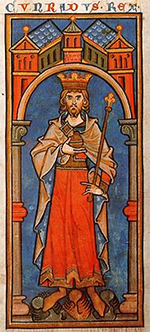Conrad III: King of Germany
Conrad III was King of Germany for 14 years in the 12th Century. His turbulent reign was full of conflict both within Germany and elsewhere. 
He was born in 1093 in Bamberg, Bavaria. His father was Frederick I, Duke of Swabia, and his mother was Agnes, whose father was Emperor Henry IV. Young Conrad grew up in the shadow of an ongoing internal struggle between that emperor and his son, Emperor Henry IV, and between each of those monarchs in turn and the duchies of Germany. Conrad's father's loyalty to Henry IV convinced the monarch to name him Duke of Swabia, and that loyalty carried down from father to son and from father to son, as Henry V appointed Conrad Duke of Franconia and, while away fighting in Italy, gave him the regency of Germany, along with his older brother, Frederick II. That was the same Frederick who claimed the kingship after Henry V's death, citing familial connections. Instead, an electoral assembly chose Lothair III as the next King of Germany. The new king banned Frederick and stripped Conrad of his titles. The brothers still had support in Germany, however, and a rival set of electors chose Conrad as their anti-king in 1127. He followed that up with a quick jaunt to Italy, to accept the title of King of Italy from the Archbishop of Milan. The title didn't translate into anything much material, and Conrad went back to Germany in 1130, ostensibly to retake the towns of Nuremberg and Speyer, which Lothair had seized a year earlier. The struggle between king and opposers ended in 1135, with Conrad giving up the Italian crown and all opposition claims and Lothair giving the brothers back their lands. When Lothair died two years later, another electoral assembly gathered, in Coblenz, and elected Conrad to be their sovereign. He was crowned King of Germany on March 13, 1138. Conrad had married Gertrude of Comburg in 1115. She died in 1130, having given birth to no children. Conrad married again six years later, to Gertrude of Sulzbach. They had two children, Henry (1136) and Frederick (1145). Conrad's main form of opposition came from Henry the Proud, Lothair's son-in-law, who refused to pay homage to the new king. In response, Conrad stripped Henry of his lands. Henry responded by taking up arms, and a civil war ensued. Henry died the following year, and his son Henry the Lion continued the fight. Conrad eventually prevailed, at Weinsberg, in 1140. It took a further two years, but an agreement of lasting peace came at Frankfurt in 1142. Conrad had problems on other fronts by this time, as Bavaria and Saxony were leading yet another revolt against authority. Conrad and Agnes had had a son, Henry, in 1136. When the lad was 10, his father decided to join the Second Crusade. Conrad crowned his son, known as Henry Berengar, king in his stead and then set out to join Louis VII of France and thousands of others on an expedition to the Holy Land. Conrad and his 20,000 soldiers crossed Anatolia and did battle with the Seljuk Turks. The result, the Battle of Dorylaeum, was a disaster for the German forces, who suffered very heavy losses. Conrad and 2,000 of his soldiers escaped, but the rest of the contingent suffered death or capture. Conrad eventually reached the Holy Land, taking part in the 1148 Siege of Damascus, which failed. A disillusioned Conrad returned to Germany. He found that he had to fight anew when he got there. He and his son banded together in 1150 and threw off a challenge from Welf VI and Welf VII at the Battle of Flochberg. Henry Berengar died that same year, leaving Conrad's youngest son, Frederick, as the heir apparent. He was all of 6. Conrad died on Feb. 15, 1152. He knew that he was dying and designated as his successor not his son but his nephew, Frederick Barbarossa.
|
|
Social Studies for Kids
copyright 2002–2026
David White




